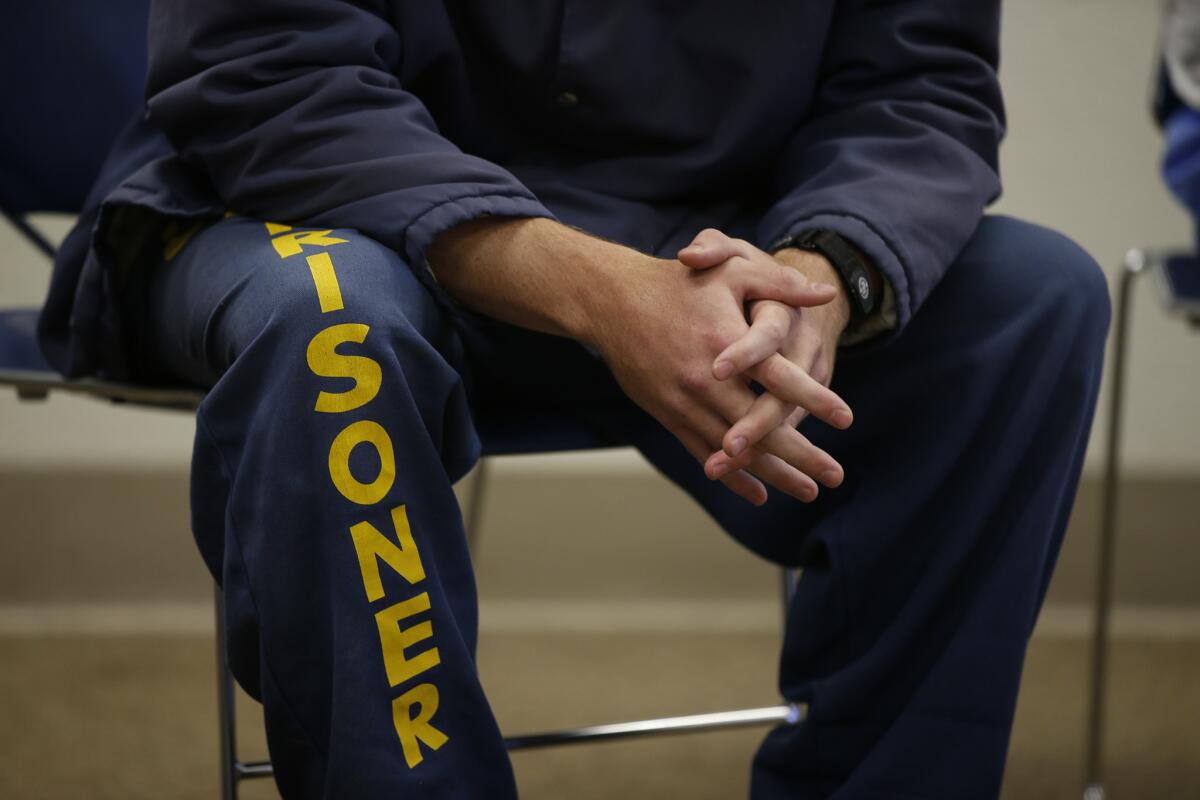Debate over sex offenders moves to court as California undertakes prison parole overhaul

- Share via
Reporting from Sacramento — A Los Angeles-based nonprofit is claiming California prison officials have undermined last fall’s ballot measure to overhaul the state’s parole process by excluding sex offenders from consideration for early release.
The Alliance for Constitutional Sex Offense Laws, which advocates for the rights of those convicted of sex crimes and their families, says the exemption — written into newly released guidelines to implement Proposition 57 — “impermissibly restricts and impairs the scope” of the initiative.
Those regulations were released in March and won initial approval from state regulators a month later. But the original ballot measure did not exclude inmates convicted of sex crimes from the chance of getting an earlier hearing before the state parole board.
The group filed the lawsuit in late April against the state Department of Corrections and Rehabilitation and its director, Scott Kernan. It argues the new rules are unconstitutional and it asks a judge to order corrections officials to withdraw and repeal them, according to the complaint filed in Sacramento County.
“We want the benefits of Proposition 57 to be provided to people who have been convicted of ‘non-violent’ sex offenses,” said attorney Janice Bellucci, who is representing the alliance and an inmate who brought the case forward. “It is a basic rule of law that regulations cannot be broader than the law that they are implementing.”
A spokesperson for the corrections agency said neither Kernan nor the department could comment on the pending litigation.
Debate over the treatment of sex offenders under Proposition 57 has simmered since last fall’s campaign season. But at that point, the outcry came from law enforcement officials and prosecutors who argued they did not want to see the ballot measure’s benefits extended to rapists and child molesters.
The sweeping initiative, approved by 65% of voters, gave new power to the State Board of Parole Hearings to grant early release to prisoners whose primary sentences are for crimes not designated as “violent” under California law. It also provided new ways for all inmates to earn time credits toward their sentences for good behavior and for enrolling in certain career, rehabilitation and education programs.
Opponents of Proposition 57 warned that the list of crimes under the violent felony penal code was short and porous, inspiring efforts in the Legislature this session to expand the definition of what constitutes a violent crime under state law.
In his January budget proposal, Gov. Jerry Brown attempted to address those concerns, directing the state corrections department to exclude all sex offenders from early parole consideration.
The department’s new parole guidelines are expected to receive final approval in the fall after a public comment period. Changes to how inmates can earn credits, which can help reduce their sentences, are already underway, while the new parole eligibility requirements won’t take effect until July.
But the advocacy group that filed the lawsuit wants the state agency to revise its rules. It contends that there was plenty of public debate over sex offenders during the Proposition 57 campaign — and that even then, voters passed the measure.
Revised projections in the governor’s May budget show the ballot initiative could reduce the California inmate population by as many as 11,500 within the next four years, an increase of more than 20% from previous estimates in January.
The lawsuit alleges the new exclusion applies to a whole class of nonviolent offenders, including people charged with crimes where there was no sexual contact with a victim.
As of Dec. 31, the number of inmates in California prisons who would have to register as sex offenders upon release stood at 22,455, less than 20% of the population housed at state prisons. Nearly 18,000 were designated as “violent” offenders, while more than 4,521 were considered “nonviolent,” according to state corrections officials.
Bellucci said those cases could include a diverse group of offenders. In theory, she said, the new regulations could unfairly penalize an 18-year-old convicted of public indecency for streaking in high school, or a 16-year-old sentenced for child pornography after distributing nude photos of herself.
“Anybody who has been convicted of a violent offense, like rape, Prop. 57 doesn’t apply to them,” Bellucci said. “We are talking about nonviolent offenses, which includes these non-contact offenses.”
Longtime opponents who campaigned to stop the ballot measure say they saw the issue raised by the lawsuit coming months ago.
“It was [an] inevitability,” said Michele Hanisee, president of the Assn. of Deputy District Attorneys. “Proposition 57, as it was written, applied to all nonviolent offenders and didn’t exclude any subclass of offenders.”
While no court date has been set in the lawsuit, state corrections officials have until the end of May to respond to the complaint.
New prison parole overhaul guidelines win initial approval from California state regulators »
ALSO:
What is a ‘violent crime’? For California’s new parole law, the definition is murky— and it matters
Governor’s budget gives a glimpse into challenges ahead for prison parole overhaul in California
Updates on California politics
More to Read
Get the L.A. Times Politics newsletter
Deeply reported insights into legislation, politics and policy from Sacramento, Washington and beyond. In your inbox twice per week.
You may occasionally receive promotional content from the Los Angeles Times.











